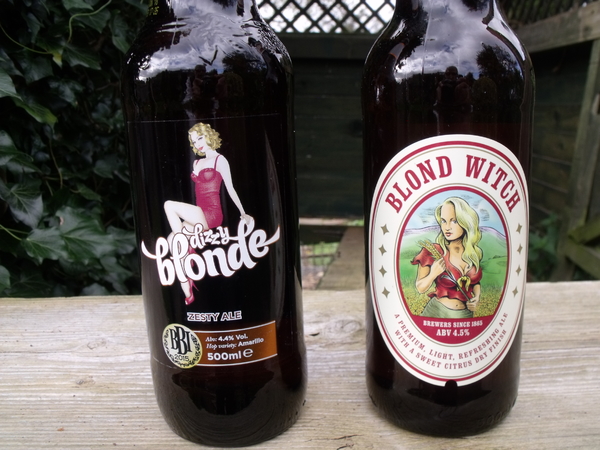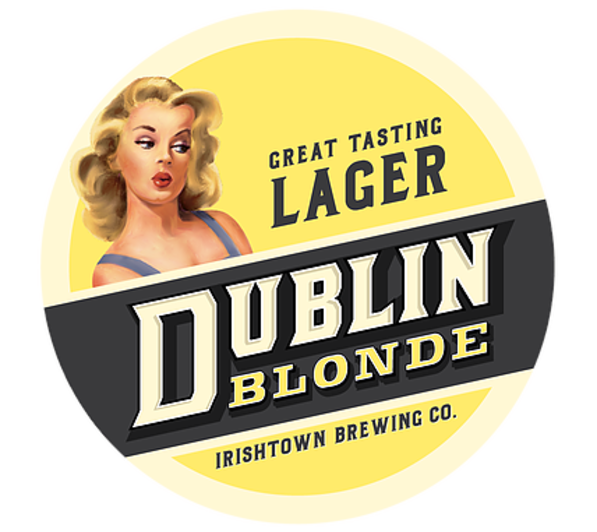Time to kick sexism out of beer
Added: Thursday, October 26th 2017

By Katie Wiles www.wilesaboutbeer.com
Let’s face it -- for most women who work in the beer world, or women who simply enjoys a good beer, it's pretty much a given that you’ve had an uncomfortable experience before. An inappropriate touch, a stare that doesn’t quite meet the eyes, a casual remark such as “are you sure you can handle a whole pint?” How many of these touches, stares and comments are being encouraged by the very beer that we love to drink - wrapped up with a scantily-clad, big-breasted women on the label? (Beer labels shown above are from Robinson's and Moorhouse's.)
Sexist beer labels may not be as prevalent as they used to be - but not a week goes by without an example cropping up on social media. The most recent example of “Deepthroat” beer clearly indicates fellatio on the label. Another, Irishtown Brewing, boasts the tagline "Dublin blonde goes down easy". These examples are both demeaning and degrading to women. Furthermore, they reinforce the stereotype that beer is a "man's drink" and that women have no right to it.
According to Jane Peyton, beer sommelier and founder of Beer Day Britain, an offensive beer label can go a long way to discouraging women from trying a brew. She says “I often speak to women who do not drink beer and ask them why. They give an array of answers which includes that beer is very blokey -- and then they cite the sexist pump clips. They also often say that men seem to claim beer for themselves and equate drinking beer with being masculine, which puts them off.”
Yes, beer is still predominantly consumed by men, but brewers simply cannot afford to alienate the growing proportion of their customer base that is made up by women. Women are increasingly drinking beer, brewing beer, selling beer and writing about beer -- and this trend is only set to grow in the future. Beer will not just be a "man's drink" in the future.
Is sexist labelling in decline or in fact growing as more women enter the beer world? The beer industry seems to think it is the former. The Portman Group, which acts as the responsibility body for drinks producers in the UK, says that “in recent years, we have seen an incredible and exciting growth of new, small, independent craft beer cider and spirits brewers and distillers.The vast majority of businesses -- large and small -- fully understand the need to market alcohol products creatively but responsibly and understand the importance of upholding the industry codes. So while the vast majority of producers get it right, only a very small minority will push at the boundaries of what is acceptable.”
Jane Peyton agrees, saying "thankfully the number of British breweries using sexist imagery or words to market their beer is decreasing. Enlightened brewers tend to use gender neutral imagery and brand names that do not insult anyone. I have seen the Dublin brewery branding and the revolting Italian Deepthroat brand. Both breweries must be desperate to use this type of marketing. If their beer is good quality then they do not need to resort to using imagery like that."
If sexist labelling is on the out, however, why are we still seeing these disgusting examples appear? Furthermore, what is being done when they do arise? I asked the Portman Group how the industry is responding to sexist labelling, and they assured me that there is a strong system of "self-regulation" in place with specific rules to prevent brands from using sexualised images or alluding to sexual activity on marketing materials. If a brewer is found in breach of this Code a complaint can be made against them, which would be considered by an Independent Complaints Panel. If that complaint is upheld, the Portman Group may decide to send a Retailer Alert Bulletin to ask retailers to not restock the offending drink until it has been re-labelled or amended.
Sounds great -- if you are a strong believer in self-regulation. But how many cases are actually brought forward -- and disciplined - on this issue?
The Portman Group admits that there have been relatively few complaints under this rule, the last one having been made in 2015. Since the Code was introduced in 1996 there have been just 140 complaints upheld across the alcohol industry as a whole -- including alcopops, spirits, wine and beer. This is roughly about six cases a year, an even smaller proportion of which relates to beer. The number of those that have seen a Retailer Alert Bulletin issued as a result? Who knows.
Surely there must be a better way of regulating the beer industry than a loosely followed Code of Practice and relying on individuals and the media to name and shame the worst culprits?
The American Brewers Association certainly thinks so. On the other side of the pond, the organisation took a much stricter stance on sexism in April 2017 by updating its Advertising and Marketing Code so that any beer deemed to be sexist or demeaning could not be promoted or celebrated by the Brewers Association. Lotte Peplow, who represents them, says it's a good idea and that “any initiatives that address offensive and explicit labels should be warmly welcomed. I would like to see organisations like CAMRA, SIBA and beer competitions adopting this practice to actively discourage sexist labelling.” I couldn't agree more.
I do think that sexism in the beer world is slowly and gradually on its way out. However, its going to be a long, drawn out and painful process that could take decades if the industry doesn't start to band together to tackle the issue. Why can't industry bodies and other brewers join the voices of beer writers and beer drinkers to stand up and say "this is not acceptable behaviour"? Beers that are demeaning to women should not win awards, receive accreditation or be able to use industry logos. And surely there should be robust regulation in force whereby everyday consumers can make a complaint about a label and see concrete action as a result.
Until the industry gets behind this issue, we will continue to see the trickle of the rogue brewers designing a beer label or pump clip that makes most of us cringe with disbelief. It may take years and years until this practice is fully eradicated in Britain. In the meantime, however, I will take heart in knowing that both male and female beer drinkers are not letting them off the hook, and are continualy calling them out. Women in the beer world are here to stay, and I look forward to the day when they are finally treated as customers, rather than as a marketing tool for brewers.





